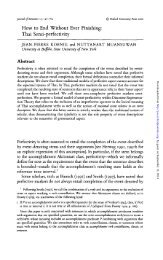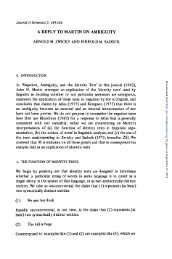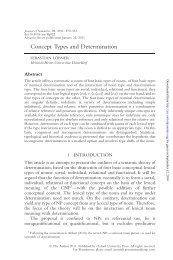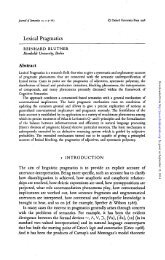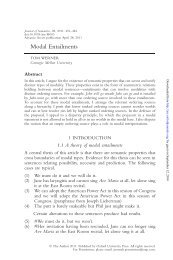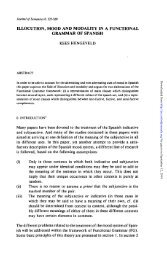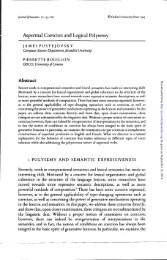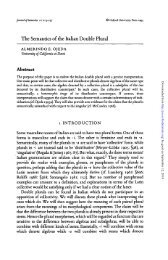Exclusive Company: Only and the Dynamics of Vertical Inference ...
Exclusive Company: Only and the Dynamics of Vertical Inference ...
Exclusive Company: Only and the Dynamics of Vertical Inference ...
You also want an ePaper? Increase the reach of your titles
YUMPU automatically turns print PDFs into web optimized ePapers that Google loves.
4 <strong>Only</strong> <strong>and</strong> <strong>the</strong> <strong>Dynamics</strong> <strong>of</strong> <strong>Vertical</strong> <strong>Inference</strong><br />
In exhibiting <strong>the</strong> behavioral symptoms <strong>of</strong> downward monotonic expressions,<br />
only a phrases are for most speakers differentiated from <strong>the</strong> corresponding<br />
non-monotonic a <strong>and</strong> only a conjunctions. Thus compare: 4<br />
(5") a. Tonight <strong>and</strong> only tonight, <strong>the</strong> opalescent squid will mate. In a frenzy<br />
<strong>the</strong>y seize each o<strong>the</strong>r, coupling again <strong>and</strong> again ...<br />
(Voice-over from 3-D IMAX movie Into <strong>the</strong> Deep)<br />
b. %Tonight <strong>and</strong> only tonight will <strong>the</strong> opalescent squid mate.<br />
In <strong>the</strong> light <strong>of</strong> <strong>the</strong>se diagnostics, we might consider casting aside <strong>the</strong><br />
symmetric conjunctive <strong>the</strong>ory in favor <strong>of</strong> one <strong>of</strong> a range <strong>of</strong> asymmetric analyses<br />
which agree that <strong>the</strong> relation <strong>of</strong> (ia) to (ib) is not logical entailment while<br />
differing on just what if anything it is. On <strong>the</strong> analysis in (6),<br />
(6) Horn (1969): only (x — a, Fx)<br />
Presupposes: Fa<br />
Asserts: ~3y(y ^ a & Fy)<br />
whose silver anniversary <strong>the</strong> world recently celebrated, (7a) presupposes ra<strong>the</strong>r<br />
than entailing (7b), thus preserving <strong>the</strong> distinction between <strong>the</strong> negativeasserting<br />
only Muriel sentence <strong>and</strong> its truly conjunctive Muriel <strong>and</strong> only Muriel<br />
counterpart in (7d).<br />
(7) a. <strong>Only</strong> Muriel voted for Hubert.<br />
b. Muriel voted for Hubert.<br />
c. Nobody distinct from Muriel voted for Hubert.<br />
d. Muriel <strong>and</strong> only Muriel voted for Hubert.<br />
On this view, <strong>the</strong> suspension, polarity, <strong>and</strong> inversion facts <strong>of</strong> (3)-(i) would<br />
follow from <strong>the</strong> premise that <strong>the</strong>se properties are associated with <strong>the</strong> negative<br />
assertion or entailment <strong>of</strong> <strong>the</strong> only sentence. A number <strong>of</strong> subsequent analyses<br />
(e.g. Konig 1991; Barker 1993) have essentially followed <strong>the</strong> same line, which is<br />
also echoed in <strong>the</strong> o<strong>the</strong>rwise ra<strong>the</strong>r divergent analyses <strong>of</strong> negative polarity<br />
phenomena in Ladusaw (1980) <strong>and</strong> Linebarger (1981, 1987). 5<br />
Some asymmetricalists have pushed <strong>the</strong> presuppositional envelope fur<strong>the</strong>r<br />
into <strong>the</strong> pragmatics, deriving (7b) as a non-truth-conditional aspect <strong>of</strong> conventional<br />
meaning—a conventional implicature or pragmatic presupposition—or<br />
even as a conversational implicature. On such accounts, <strong>the</strong> positive component<br />
<strong>of</strong> only is not part <strong>of</strong> what is said but part <strong>of</strong> what is implicated in an utterance<br />
like (7a). Thus in Horn (1979), <strong>the</strong> positive component <strong>of</strong> meaning contributed<br />
by only is taken to be a non-truth-conditional constraint on <strong>the</strong> appropriate<br />
assertion <strong>of</strong> (7a); <strong>the</strong> notion appealed to (with some reservations) is that <strong>of</strong><br />
conventional implicature, a la Grice (1975) <strong>and</strong> Karttunen & Peters (1979). 6 The<br />
same position is endorsed in Rooth (1985), Krifka (1993), <strong>and</strong> Fre<strong>the</strong>im (1995).<br />
More radically, <strong>the</strong> positive component can be taken to represent not a<br />
Downloaded from http://jos.oxfordjournals.org/ by guest on September 12, 2014



